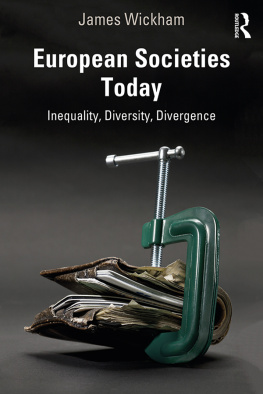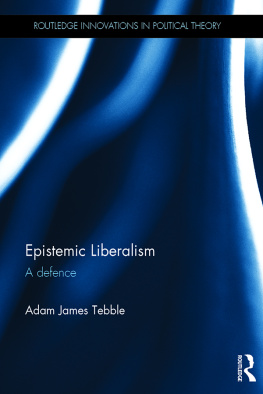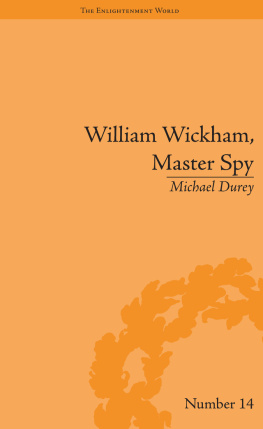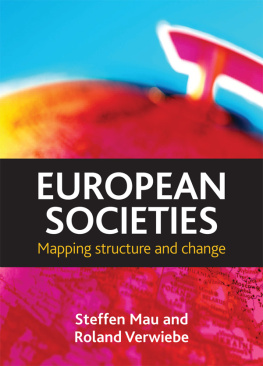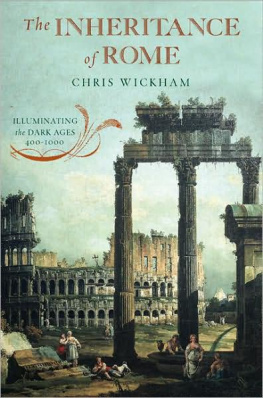James Wickhams valuable text brilliantly synthesises trends on social change and changing inequalities from across Europe. It will be an excellent teaching resource.
Mike Savage, LSE, UK
James Wickham has achieved the near impossible: providing clear, succinct and spot on analyses of the current complex trends in European inequalities. The chapters capture the diversity of European countries histories and institutional contexts while also illuminating how recent social developments may be leading to processes of European convergence or divergence. This book may be billed as a textbook, but I would recommend all scholars of inequalities in European societies to consult it.
Jill Rubery, University of Manchester, UK
Rich in data, lively and clear in style, reasoned and vigorous, this is an enlightening exploration of contemporary European societies. Seen mainly through the lenses of sociology and political economy, the book is ideal for students seeking a comparative analysis of advanced capitalist societies but will also be of great interest to anyone interested in the current crises of the European project and the future of Social Europe.
Sen Riain, National University of Ireland Maynooth, Ireland
This book addresses a big, complex, vital topic that is central to contemporary debates on European democratic societies and their future. Its skilful mix of theory, illuminating descriptions and illustrative historical comparisons is richly informative and instructive. The book also raises challenging questions and prospects for European welfare states that invite the readers careful reflection and response. This is a highly valuable, authoritative text that will attract a wide audience.
Catherine Casey, Loughborough University, UK
European Societies Today
This accessible new text introduces students to contemporary European societies by examining structures of inequality, making sense of the empirical and historical contexts.
Focusing on seven differing European societies (France, Germany, Ireland, Italy, Poland, Sweden and the UK), it examines the different ways in which sociology and political economy understand the social structure of contemporary Europe. Separate chapters outline key aspects of inequality, beginning with income, wealth and poverty, followed by occupation and social class, gender, regional inequality, ethnicity and migration. By focusing on the role of the national welfare states of Europe in restraining economic inequality, the book enables a realistic appraisal of the European Social Model.
Key features:
- Examines European distinctiveness and difference;
- Visual presentation of data accessibly informs the reader about distinctive features of specific societies;
- Comparative approach extends to evaluate the extent to which Europe differs from the USA;
- Illustrates how the UKs half-hearted relationship to Europe is not just a matter of history or politics but also of contemporary social structure;
- Key in-text features include discussion topics and key readings.
This textbook will be essential reading for students of European studies, European politics, European societies, social inequality/structure, European welfare and policy, and more broadly to sociology and public policy and administration.
James Wickham is a Fellow Emeritus of Trinity College Dublin (TDC), Ireland.
First published 2020
by Routledge
2 Park Square, Milton Park, Abingdon, Oxon OX14 4RN
and by Routledge
52 Vanderbilt Avenue, New York, NY 10017
Routledge is an imprint of the Taylor & Francis Group, an informa business
2020 James Wickham
The right of James Wickham to be identified as author of this work has been asserted by him in accordance with sections 77 and 78 of the Copyright, Designs and Patents Act 1988.
All rights reserved. No part of this book may be reprinted or reproduced or utilised in any form or by any electronic, mechanical, or other means, now known or hereafter invented, including photocopying and recording, or in any information storage or retrieval system, without permission in writing from the publishers.
Trademark notice: Product or corporate names may be trademarks or registered trademarks, and are used only for identification and explanation without intent to infringe.
British Library Cataloguing in Publication Data
A catalogue record for this book is available from the British Library
Library of Congress Cataloging in Publication Data
Names: Wickham, James (James John Rufus) author.
Title: European societies today : inequality, diversity, divergence / James Wickham.
Description: 1 Edition. | New York : Routledge, 2020. | Includes bibliographical references and index.
Identifiers: LCCN 2019058821 (print) | LCCN 2019058822 (ebook) | ISBN 9781138386907 (hardback) | ISBN 9781138386914 (paperback) | ISBN 9780429426537 (ebook)
Subjects: LCSH: EuropeSocial conditions21st century. | EuropeSocial policy21st century. | EqualityEuropeHistory21st century. | Urban policyEurope. | MulticulturalismEurope.
Classification: LCC HN373.5 .W5283 2020 (print) | LCC HN373.5 (ebook) | DDC 305.80094dc23
LC record available at https://lccn.loc.gov/2019058821
LC ebook record available at https://lccn.loc.gov/2019058822
ISBN: 978-1-138-38690-7 (hbk)
ISBN: 978-1-138-38691-4 (pbk)
ISBN: 978-0-429-42653-7 (ebk)
For Lorelei, again
This book is a revised version of my monograph Unequal Europe. Once again I thank the many people who helped develop that volume. However, European Societies Today developed out of teaching contemporary European social structure to students at Trinity College Dublin. My first thanks are therefore to my students at Trinity who not only listened but discussed and argued in lectures and seminars over the years. Later, working on inequality in Ireland at the Dublin think-tank TASC was part of the process whereby socio-economic inequality became the unifying theme of the whole book; my thanks to my colleagues at TASC Alicja Bobek, Cian McMahon, Cormac Staunton, David Begg, Rory Hearne and Sinead Pembroke. Once again discussions with political economists Ronan OBrien and Paul Sweeney helped clarify arguments about the consequences of the European Unions economic governance; many conversations with historian John Horne illuminated the historical background.
At Routledge Andrew Taylor supported the idea of turning Unequal Europe into a teaching text. My thanks to the anonymous referees who provided such useful and supportive critical comments on the original proposal. With astonishing patience Andrew Taylor and Sophie Iddamalgoda ensured a messy manuscript became a published text. And finally, my thanks to Lorelei without whom the book would never have been finished.
What makes Europe European? Ask tourists from other continents and they will probably mention our art, our architecture, our old cities; Venice will rather quickly appear. The Europe as Venice trope is rather unfortunate: the beautiful city that is sinking into the sea, the city where the population appears in terminal decline, the city where tourists outnumber inhabitants
For those who actually live here one way in which Europe is distinctive is the sort of society in which we live. Arguably and this is the thesis of the book Europe is distinctive because of the particular nation states of which it is comprised. These states are not just

